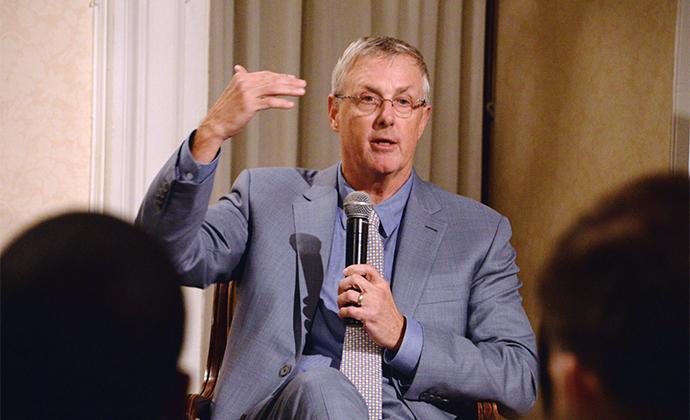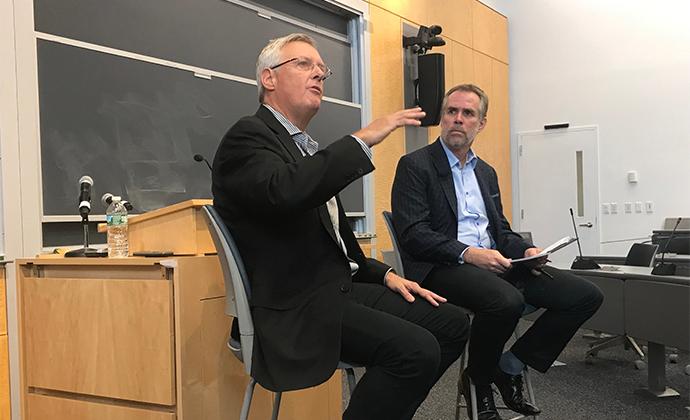An Insider’s Look at Life as In-House Counsel
Former Apple GC Bruce Sewell teaches a new seminar at Columbia Law on the role of inside counsel and discusses why it’s a rewarding career.
As general counsel and senior vice president at Apple Inc., Bruce Sewell was one of the most powerful lawyers on the planet. Overseeing a department of 900 at the world’s largest technology company from 2009 to 2017, Sewell worked as one of the most trusted advisers to CEOs Steve Jobs and Tim Cook on issues such as intellectual property, privacy, and antitrust compliance.
“The whole point of being in-house is you have shared responsibilities with the chief executive to solve problems and come up with solutions,” said Sewell in one of the public talks he gave at Columbia Law School this winter, where he served as a lecturer in law and taught a four-week seminar entitled Leadership & Organizational Character: Role of Inside Counsel.
Sewell was candid with students about the day-to-day responsibilities of a GC during a program with Eric Talley, an Isidor and Seville Sulzbacher Professor of Law and co-director of the Ira M. Millstein Center for Global Markets and Corporate Ownership. “You don’t really practice law as a GC,” he said. “At Apple, I was just as much a businessman, a negotiator, and a spokesman.”
Sewell said general counsels can be effective leaders only if they are legal polymaths. “The difference between working as a GC and at a law firm is vast,” said Sewell, who was once a partner at Brown & Bain PA, as well as general counsel for Intel. “A GC is the consummate generalist. You need to be competent in every issue facing a law firm.”
His course offered a deep dive into the responsibilities of a general counsel, which include overseeing the in-house legal department and outside counsel; domestic and international government relations; SEC compliance; and ethics and corporate social responsibility. “The seminar focused on the ways that legal leaders in a corporation can influence the structure of an organization and its culture, and there are a lot of ways to do that,” says Sewell.
“Embracing and Managing Risk”
Sewell’s residence at the Law School was supported by the new Reuben Mark Initiative for Organizational Character and Leadership, which leverages the intellectual capital of Columbia Law School and Columbia Business School to cultivate leadership skills and the characteristics necessary to create an optimal organizational culture. Mark was the longest-serving leader in the history of the Colgate-Palmolive Company and was known for creating a distinctive corporate culture at Colgate.
In another public program, under the auspices of the Columbia Law School Legal Tech Association, Sewell explained that as general counsel he thrived on being integral to almost every decision Apple made. “As the GC, I spent more time interacting with senior executives than with the legal department generally,” he said. And as head of the legal department, he said, his role was “to supply direction and be a strategic compass if you will.”
He emphasized the attitudinal differences between firm and corporate work. “Most of what you do in firms is avoiding and minimizing risk,” he said. “As a GC, you’re embracing and managing risk. You need to be sympathetic to that approach in a corporation.” Indeed, he said the biggest challenge when he went in-house was “to learn not to think like a lawyer, which was a hard transition to make.”
Growth Industry
Sewell said that the job market is expanding for in-house counsel, and he designed his course so students could prepare for an in-house career path. “Large international corporations are basically building their own law firms,” he said, explaining that companies still rely on outside firms for certain functions such as complex litigation. “But licensing and IP are better handled in-house because you know what is really important to the corporation.”
He advised students that big law firms are the training grounds for in-house counsel. “Corporations are not set up to train lawyers,” he said, adding that three to five years at a firm is the “sweet spot” before making the career shift. “When you go in-house, you need to be a legal expert from day one,” he said.
Sewell also shared some of his personal philosophy for success—what he dubbed “Sewell’s Rules”—from a commencement speech he gave a few years ago at his alma mater, George Washington University Law School. “Think of your peers as if they were your boss, and think of your boss as if she is your peer,” he said.
As Sewell made clear to students, GCs and CEOs are peers who work in tandem in multiple ways. “It’s a partnership that develops a unified vision of how the corporation is going to operate within society,” he said.
# # #
Published on March 29, 2019

